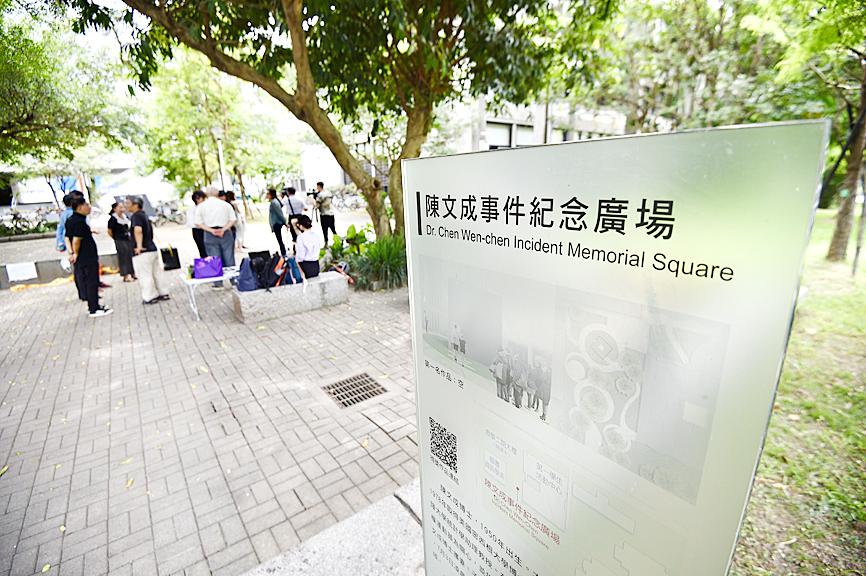National Taiwan University (NTU) student groups on Thursday held a groundbreaking ceremony for a memorial to honor Chen Wen-chen (陳文成), a democracy advocate who died under mysterious circumstances and whose body was found on the NTU campus in 1981.
Chen, a 31-year-old mathematics professor at Carnegie Mellon University, was visiting family in Taiwan when he was found dead near NTU’s main library on July 3, 1981, one day after being detained for interrogation by the Taiwan Garrison Command, a since-disbanded state security force.
On Thursday, NTU’s undergraduate and graduate student associations and the Dr Chen Wen-chen Memorial Foundation and Museum officially began construction on a memorial square, after reaching their fundraising goal of NT$12 million (US$405,501) earlier this year.

Photo: Peter Lo, Taipei Times
“Without the students’ efforts, this groundbreaking could never have happened,” foundation chairwoman Yang Huang Mei-hsing (楊黃美幸) said.
Because the square’s purpose is to memorialize a tragedy, its design emphasizes empty space and encourages visitors to reflect — not only on what happened to Chen, but on the broader abuses of Taiwan’s authoritarian past, she added.
“University campuses were a major front in the government’s efforts to brainwash and control Taiwanese and so our job is not only to keep authoritarianism off the campus, but to record the scars that it left behind,” NTU Graduate Student Association president Wang Yu-chun (王昱鈞) said.
It is important for people to know the truth about the past, because “without the truth, there can be no forgiveness,” he added.
On July 2, the campus held a memorial event at which Vice President William Lai (賴清德) and others spoke to mark the 39th anniversary of Chen’s death.

CAUTION: Based on intelligence from the nation’s security agencies, MOFA has cautioned Taiwanese travelers about heightened safety risks in China-friendly countries The Ministry of Foreign Affairs (MOFA) yesterday urged Taiwanese to be aware of their safety when traveling abroad, especially in countries that are friendly to China. China in June last year issued 22 guidelines that allow its courts to try in absentia and sentence to death so-called “diehard” Taiwanese independence activists, even though Chinese courts have no jurisdiction in Taiwan. Late last month, a senior Chinese official gave closed-door instructions to state security units to implement the guidelines in countries friendly to China, a government memo and a senior Taiwan security official said, based on information gathered by Taiwan’s intelligence agency. The

Taiwan Semiconductor Manufacturing Co (TSMC), the world’s largest contract chipmaker, said yesterday that it is looking to hire 8,000 people this year, at a time when the tech giant is expanding production capacity to maintain its lead over competitors. To attract talent, TSMC would launch a large-scale recruitment campaign on campuses across Taiwan, where a newly recruited engineer with a master’s degree could expect to receive an average salary of NT$2.2 million (US$60,912), which is much higher than the 2023 national average of NT$709,000 for those in the same category, according to government statistics. TSMC, which accounted for more than 60 percent

The National Immigration Agency (NIA) said yesterday that it will revoke the dependent-based residence permit of a Chinese social media influencer who reportedly “openly advocated for [China’s] unification through military force” with Taiwan. The Chinese national, identified by her surname Liu (劉), will have her residence permit revoked in accordance with Article 14 of the “Measures for the permission of family- based residence, long-term residence and settlement of people from the Mainland Area in the Taiwan Area,” the NIA said in a news release. The agency explained it received reports that Liu made “unifying Taiwan through military force” statements on her online

Tung Tzu-hsien (童子賢), a Taiwanese businessman and deputy convener of the nation’s National Climate Change Committee, said yesterday that “electrical power is national power” and nuclear energy is “very important to Taiwan.” Tung made the remarks, suggesting that his views do not align with the country’s current official policy of phasing out nuclear energy, at a forum organized by the Taiwan People’s Party titled “Challenges and Prospects of Taiwan’s AI Industry and Energy Policy.” “Taiwan is currently pursuing industries with high added- value and is developing vigorously, and this all requires electricity,” said the chairman